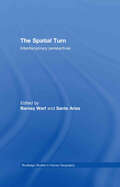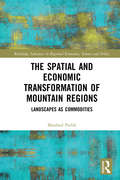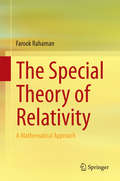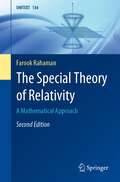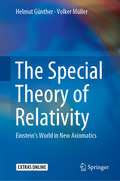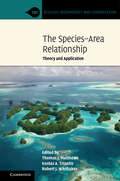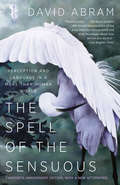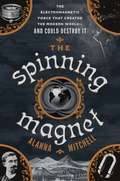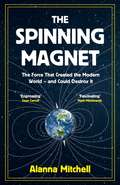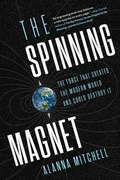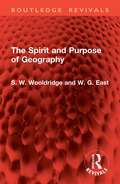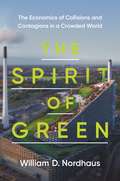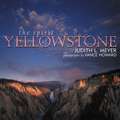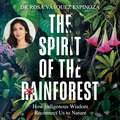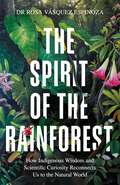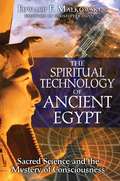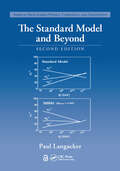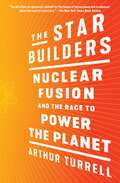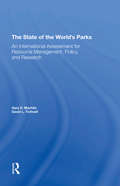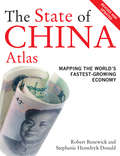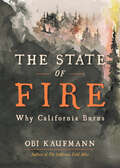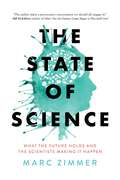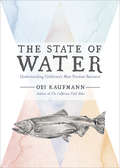- Table View
- List View
The Spatial Turn: Interdisciplinary Perspectives (Routledge Studies in Human Geography)
by Barney Warf Santa AriasAcross the disciplines, the study of space has undergone a profound and sustained transformation. Space, place, mapping, and geographical imaginations have become commonplace topics in a variety of analytical fields in part because globalization has accentuated the significance of location. While this transformation has led to a renaissance in human geography, it also has manifested itself in the humanities and other social sciences. The purpose of this book is not to announce that space is significant, which by now is well known, but to explore how space is analyzed by a variety of disciplines, to compare and contrast these approaches, identify commonalities, and explore how and why differences appear. The volume includes works by 13 scholars from a variety of geographical regions and disciplines. The chapters combine up-to-date literature reviews concerning the role of space in each discipline and several offer original empirical analyses. Some chapters are concerned with Geography while others explore the role of space in contemporary Anthropology, Sociology, Religion, Political Science, Film, and Cultural Studies. The introduction surveys the development of the spatial turn across the fields under consideration. Despite frequent reference to the spatial turn, this is the first volume to explicitly address how theory and practice concerning space, is used in a variety of fields from diverse conceptual perspectives. This book will appeal to everyone conducting conceptual and theoretical research on space, not simply in Geography, but in related fields as well.
The Spatial and Economic Transformation of Mountain Regions: Landscapes as Commodities (Routledge Advances in Regional Economics, Science and Policy)
by Manfred PerlikMountain regions are subject to a unique set of economic pressures: they act as collective enterprises which have to valorize rare resources, such as spectacular landscapes. While primarily rural in nature, they often border large cities, and the development of industries such as hydroelectric power and the rapid development of tourism can bring about sweeping socio-economic change and vast demographic alterations. The Spatial and Economic Transformation of Mountain Regions describes the socio-economic changes and spatial impacts of the last four decades, with the transformation of mountain areas held up as an example. Much of the real-world context draws on the Alps, spanning as they do the significant economies of France, Italy, Germany, Switzerland, and Austria. Chapters address academic discourse on regional development in these mountain areas and suggest alternative approaches to the liberal-productivist societal model. This book will be essential reading for professionals, institutions, and NGOs searching for counter-models to the existing marketing approaches for peripheral areas. It will also be of interest to students of regional development, economic geography, environmental studies, and industrial economics.
The Special Theory of Relativity
by Farook RahamanThe book expounds the major topics in the special theory of relativity. It provides a detailed examination of the mathematical foundation of the special theory of relativity, relativistic mass, relativistic mechanics and relativistic electrodynamics. As well as covariant formulation of relativistic mechanics and electrodynamics, the book discusses the relativistic effect on photons. Using a mathematical approach, the text offers graduate students a clear, concise view of the special theory of relativity. Organized into 14 chapters and two appendices, the content is presented in a logical order, and every topic has been dealt with in a simple and lucid manner. To aid understanding of the subject, the book provides numerous relevant worked examples in every chapter. The book's mathematical approach helps students in their independent study and motivates them to research the topic further.
The Special Theory of Relativity: A Mathematical Approach (UNITEXT #136)
by Farook RahamanThis textbook expounds the major topics in the special theory of relativity. It provides a detailed examination of the mathematical foundation of the special theory of relativity, relativistic mass, relativistic mechanics, and relativistic electrodynamics. As well as covariant formulation of relativistic mechanics and electrodynamics, the text discusses the relativistic effect on photons. A new chapter on electromagnetic waves as well as several new problems and examples have been included in the second edition of the book. Using the mathematical approach, the text offers graduate students a clear, concise view of the special theory of relativity. Organized into 15 chapters and two appendices, the content is presented in a logical order, and every topic has been dealt with in a simple and lucid manner. To aid understanding of the subject, the text provides numerous relevant worked-out examples in every chapter. The mathematical approach of the text helps students in their independent study and motivates them to research the topic further.
The Special Theory of Relativity: Einstein’s World in New Axiomatics
by Helmut Günther Volker MüllerThis book discusses in detail the special theory of relativity without including all the instruments of theoretical physics, enabling readers who are not budding theoretical physicists to develop competence in the field. An arbitrary but fixed inertial system is chosen, where the known velocity of light is measured. With respect to this system a moving clock loses time and a moving length contracts. The book then presents a definition of simultaneity for the other inertial frames without using the velocity of light. To do so it employs the known reciprocity principle, which in this context serves to provide a definition of simultaneity in the other inertial frames. As a consequence, the Lorentz transformation is deduced and the universal constancy of light is established. With the help of a lattice model of the special theory of relativity the book provides a deeper understanding of the relativistic effects. Further, it discusses the key STR experiments and formulates and solves 54 problems in detail.
The Species–Area Relationship: Theory and Application (Ecology, Biodiversity and Conservation)
by Robert J. Whittaker Thomas J. Matthews Kostas A. TriantisThe Spell of the Sensuous: Perception and Language in a More-than-Human World
by David AbramAnimal tracks, word magic, the speech of stones, the power of letters, and the taste of the wind all figure prominently in this intellectual tour de force that returns us to our senses and to the sensuous terrain that sustains us. This is a major work of ecological philosophy that startles the senses out of habitual ways of perception.
The Spinning Magnet: The Electromagnetic Force That Created the Modern World--and Could Destroy It
by Alanna MitchellThe mystery of Earth's invisible, life-supporting powerAlanna Mitchell's globe-trotting history of the science of electromagnetism and the Earth's magnetic field--right up to the latest indications that the North and South Poles may soon reverse, with apocalyptic results--will soon change the way you think about our planet.Award-winning journalist Alanna Mitchell's science storytelling introduce intriguing characters--from the thirteenth-century French investigations into magnetism and the Victorian-era discover that electricity and magnetism emerge from the same fundamental force to the latest research. No one has ever told so eloquently how the Earth itself came to be seen as a magnet, spinning in space with two poles, and that those poles have dramatically reversed many time, often coinciding with mass extinctions. The most recent reversal was 780,000 years ago.Mitchell explores indications that the Earth's magnetic force field is decaying faster than previously thought. When the poles switch, a process that takes many years, the Earth is unprotected from solar radiation storms that would, among other disturbances, wipe out much and possible all of our electromagnetic technology. Navigation for all kinds of animals is disrupted without a stable, magnetic North Pole. But can you imagine no satellites, no Internet, no smartphones--maybe no power grids at all?Alanna Mitchell offers a beautifully crafted narrative history of surprising ideas and science, illuminating invisible parts of our own planet that are constantly changing around us.
The Spinning Magnet: The Force That Created the Modern World – and Could Destroy It
by Alanna MitchellMany times through deep history Earth&’s magnetic poles have switched places, leaving our planet&’s protective shield weaker and life vulnerable to devastating solar storms. The last time it happened was 780,000 years ago, long before humans emerged, but it won&’t be long until it happens again. And when it does, will it send us back to the Stone Age? The Spinning Magnet is a fascinating insight into what may lie ahead. From the pivotal discoveries of Victorian scientists to the possibility of solar radiation wiping out power grids, and the secrets of electromagnetism, Alanna Mitchell reveals the truth behind one of the most powerful forces in the universe.
The Spinning Magnet: The Force that Created the Modern World and Could Destroy It
by Alanna MitchellOur future might be a world without electronics or protection from lethal solar radiationThe magnetic North Pole will eventually trade places with the South Pole. Satellite evidence suggests to some scientists that the move has already begun, but most still think it won't happen for many decades. All agree that it has happened many times before and will happen again. But this time it will be different. It will be a very bad day for modern civilization. Award-winning science journalist Alanna Mitchell tells in The Spinning Magnet the fascinating history of one of the four fundamental physical forces in the universe, electro-magnetism. From investigations into magnetism in 13th century feudal France and the realization six hundred years later in the Victorian era that electricity and magnetism were essentially the same, to the discovery that the earth was itself a magnet, spinning in space with two poles and that those poles aperiodically reverse, this is an utterly engrossing narrative history of ideas and science that readers of Stephen Greenblatt and Sam Kean will love. But the recent finding that the Earth's magnetic force field is decaying ten times faster than previously thought, portending an imminent pole reversal, ultimately gives this story a spine tingling urgency. When the poles switch, a process that takes many years, the Earth is unprotected from solar radiation storms that would, among other things, wipe out all electromagnetic technology. No satellites, no internet, no smart phones--maybe no power grid at all. Such potentially cataclysmic solar storms are not unusual. The last one occurred in 2012 and we avoided returning to the dark ages only because the part of the sun that erupted happened to be facing away from the Earth. One leading US researcher is already drawing maps of the parts of the planet that would likely become uninhabitable.
The Spirit and Purpose of Geography (Routledge Revivals)
by S. W. Wooldridge W. G. EastFirst published in 1951, The Spirit and Purpose of Geography offers an introduction to the scope and spirit of geography. This undertakes a no less ambitious task than that of discovering the spatial relationships of the manifold features, physical and human, which diversify the Earth's surface.The authors one of whom first approached the subject from physical science, and the other from social science, co-operate to define and to discuss the historical development of their subject, its fundamental physical basis, its cartographic methods, its human aspect and its many applications and problems. Above all they submit that geography, the study of country or landscape, as a link study between the natural sciences and the humanities, constitutes not only a worthy academic discipline but also a part of a liberal education. This introductory volume is a must read for any student of geography.
The Spirit of Green: The Economics of Collisions and Contagions in a Crowded World
by William D. NordhausFrom a Nobel Prize–winning pioneer in environmental economics, an innovative account of how and why “green thinking” could cure many of the world’s most serious problems—from global warming to pandemicsSolving the world’s biggest problems—from climate catastrophe and pandemics to wildfires and corporate malfeasance—requires, more than anything else, coming up with new ways to manage the powerful interactions that surround us. For carbon emissions and other environmental damage, this means ensuring that those responsible pay their full costs rather than continuing to pass them along to others, including future generations. In The Spirit of Green, Nobel Prize–winning economist William Nordhaus describes a new way of green thinking that would help us overcome our biggest challenges without sacrificing economic prosperity, in large part by accounting for the spillover costs of economic collisions.In a discussion that ranges from the history of the environmental movement to the Green New Deal, Nordhaus explains how the spirit of green thinking provides a compelling and hopeful new perspective on modern life. At the heart of green thinking is a recognition that the globalized world is shaped not by isolated individuals but rather by innumerable interactions inside and outside the economy. He shows how rethinking economic efficiency, sustainability, politics, profits, taxes, individual ethics, corporate social responsibility, finance, and more would improve the effectiveness and equity of our society. And he offers specific solutions—on how to price carbon, how to pursue low-carbon technologies, how to design an efficient tax system, and how to foster international cooperation through climate clubs.The result is a groundbreaking new vision of how we can have our environment and our economy too.
The Spirit of Yellowstone
by Judith L. MeyerYellowstone National Park's famous geysers, exotic landscape, and beautiful wildlife partially explain its enormous popularity, but there is something more to the Yellowstone experience—a powerful spirit to the place that is more than the sum of its parts. This fascinating history of America's favorite national park shows how that spirit has endured over Yellowstone's 127-year existence. Meyer shows that Yellowstone has consistently evoked awe in different generations of Americans, even as our attitudes toward nature have changed over the years. That awe is also captured in photographer Vance Howard's evocative images, which, alongside historic photographs and other early artistic interpretations of the Park's wonders, support Meyer's view that Yellowstone's unique sense of place makes it worth preserving not only for its ecological value but for its lasting importance in American culture.
The Spirit of the Rainforest: How Indigenous Wisdom Reconnects Us to Nature
by Dr Rosa Vásquez EspinozaBefore you step into the jungle, there are a few things you need to know...Join scientist Dr Rosa Vasquez Espinoza as she uncovers one of the most unexplored regions on the planet.Dr Rosa is no stranger to the Amazon. Growing up with the rainforest as her back garden, she learnt the lessons of the rainforest from her grandmother, a native healer in natural medicine. She went on to pursue a classical education in science, gaining a PhD in the US, but has always been pulled back to the heart of the Amazon. As a leading biologist in her field, Rosa continues to explore the region through a unique blend of scientific inquiry and ancient insight.In this debut, you'll learn about Dr Rosa's journeys in the Amazon: her treacherous encounters with a boiling river, her conservation work with stingless bees, her experience of taking ayahuasca as a natural psychedelic - and all the amazing biodiversity of the rainforest. At the heart of Rosa's expedition is her passion to combine science with the indigenous knowledge of the Amazon. She shares her experience of learning from the indigenous communities that she visits, and shows what they have to teach us - stretching beyond the realm scientific knowledge. Here Rosa learns the most important lessons in how to reconnect to the natural world - and, in turn, will teach us to do the same.In this book, Rosa celebrates the richness of Amazonian culture, the wonders of biodiversity, and the enduring spiritual connections between humanity and the natural world.
The Spirit of the Rainforest: How indigenous wisdom and scientific curiosity reconnects us to the natural world
by Dr Rosa Vásquez Espinoza'Every page feels alive with passion' - Sophie Pavelle, author of 'Forget Me Not''A beautiful book' - Levison Wood, author of 'Walking the Himalayas' 'A heartfelt account of exploration and discovery' - Liz Bonnin, broadcaster Join scientist Dr Rosa Vasquez Espinoza as she uncovers one of the most unexplored regions on the planet.Dr Rosa is no stranger to the Amazon. Growing up with the rainforest as her back garden, she learnt the lessons of the rainforest from her grandmother, a native healer in natural medicine. She went on to pursue a classical education in science, gaining a PhD in the US, but has always been pulled back to the heart of the Amazon. As a leading biologist in her field, Rosa continues to explore the region through a unique blend of scientific inquiry and ancient insight.In this debut, you'll learn about Dr Rosa's journeys in the Amazon: her treacherous encounters with a boiling river, her conservation work with stingless bees, her experience of taking ayahuasca as a natural psychedelic - and all the amazing biodiversity of the rainforest. At the heart of Rosa's expedition is her passion to combine science with the indigenous knowledge of the Amazon. She shares her experience of learning from the indigenous communities that she visits, and shows what they have to teach us - stretching beyond the realm scientific knowledge. Here Rosa learns the most important lessons in how to reconnect to the natural world - and, in turn, will teach us to do the same.In this book, Rosa celebrates the richness of Amazonian culture, the wonders of biodiversity, and the enduring spiritual connections between humanity and the natural world.Before you step into the jungle, there's a few things you need to know.
The Spirit of the Rainforest: How indigenous wisdom and scientific curiosity reconnects us to the natural world
by Dr Rosa Vásquez Espinoza'Every page feels alive with passion' - Sophie Pavelle, author of 'Forget Me Not''A beautiful book' - Levison Wood, author of 'Walking the Himalayas' 'A heartfelt account of exploration and discovery' - Liz Bonnin, broadcaster Join scientist Dr Rosa Vasquez Espinoza as she uncovers one of the most unexplored regions on the planet.Dr Rosa is no stranger to the Amazon. Growing up with the rainforest as her back garden, she learnt the lessons of the rainforest from her grandmother, a native healer in natural medicine. She went on to pursue a classical education in science, gaining a PhD in the US, but has always been pulled back to the heart of the Amazon. As a leading biologist in her field, Rosa continues to explore the region through a unique blend of scientific inquiry and ancient insight.In this debut, you'll learn about Dr Rosa's journeys in the Amazon: her treacherous encounters with a boiling river, her conservation work with stingless bees, her experience of taking ayahuasca as a natural psychedelic - and all the amazing biodiversity of the rainforest. At the heart of Rosa's expedition is her passion to combine science with the indigenous knowledge of the Amazon. She shares her experience of learning from the indigenous communities that she visits, and shows what they have to teach us - stretching beyond the realm scientific knowledge. Here Rosa learns the most important lessons in how to reconnect to the natural world - and, in turn, will teach us to do the same.In this book, Rosa celebrates the richness of Amazonian culture, the wonders of biodiversity, and the enduring spiritual connections between humanity and the natural world.Before you step into the jungle, there's a few things you need to know.
The Spiritual Technology of Ancient Egypt: Sacred Science and the Mystery of Consciousness
by Christopher Dunn Edward F. MalkowskiHow ancient Egyptians understood quantum theory • Investigates the history of how modern religion and the Age of Science were inspired by the sacred science of the ancients • Examines how quantum theory explains that the cosmos arises from consciousness • Reveals the unanimity between Schwaller de Lubicz’s “sacred science” and the science of a cosmos governed by quantum mechanics Since the dawn of the Age of Science humankind has been engaged in a methodical quest to understand the cosmos. With the development of quantum mechanics, the notion that everything is solid matter is being replaced with the idea that information or “thought” may be the true source of physical reality. Such scientific inquiry has led to a growing interest in the brain’s unique and mysterious ability to create perception, possibly through quantum interactions. Consciousness is now being considered as much a fundamental part of reality as the three dimensions we are so familiar with. Although this direction in scientific thought is seen as a new approach, the secret wisdom of the ancients presented just such a view thousands of years ago.Building on René A. Schwaller de Lubicz’s systematic study of Luxor’s Temple of Amun-Mut-Khonsu during the 1940s and ’50s, Edward Malkowski shows that the ancient Egyptians' worldview was not based on superstition or the invention of myth but was the result of direct observation using critical faculties attuned to the quantum manifestation of the universe. This understanding of reality as a product of human consciousness provided the inspiration for the sacred science of the ancients--precisely the philosophy modern science is embracing today. In the philosophical tradition of Schwaller de Lubicz, The Spiritual Technology of Ancient Egypt investigates the technical and religious legacy of ancient Egypt to reveal its congruence with today’s “New Science.”
The Standard Model and Beyond (Series in Particle Physics, Cosmology and Gravitation)
by Paul LangackerThis new edition of The Standard Model and Beyond presents an advanced introduction to the physics and formalism of the standard model and other non-abelian gauge theories. It provides a solid background for understanding supersymmetry, string theory, extra dimensions, dynamical symmetry breaking, and cosmology. In addition to updating all of the experimental and phenomenological results from the first edition, it contains a new chapter on collider physics; expanded discussions of Higgs, neutrino, and dark matter physics; and many new problems. The book first reviews calculational techniques in field theory and the status of quantum electrodynamics. It then focuses on global and local symmetries and the construction of non-abelian gauge theories. The structure and tests of quantum chromodynamics, collider physics, the electroweak interactions and theory, and the physics of neutrino mass and mixing are thoroughly explored. The final chapter discusses the motivations for extending the standard model and examines supersymmetry, extended gauge groups, and grand unification. Thoroughly covering gauge field theories, symmetries, and topics beyond the standard model, this text equips readers with the tools to understand the structure and phenomenological consequences of the standard model, to construct extensions, and to perform calculations at tree level. It establishes the necessary background for readers to carry out more advanced research in particle physics. Supplementary materials are provided on the author’s website and a solutions manual is available for qualifying instructors.
The Star Builders: Nuclear Fusion and the Race to Power the Planet
by Arthur TurrellFrom a young, award-winning scientist, a look at one of the most compelling and historic turning points of our time—the race to harness the power of the stars and produce controlled fusion, creating a practically unlimited supply of clean energy.The most important energy-making process in the universe takes place inside stars. The ability to duplicate that process in a lab, once thought out of reach, may now be closer than we think. Today, all across the world teams of scientists are being assembled by the world&’s boldest entrepreneurs, big business, and governments to solve what is the most difficult technological challenge humanity has ever faced: building the equivalent of a star on earth. If their plans to capture star power are successful, they will unlock thousands, potentially millions, of years of clean, carbon-free energy. Not only would controlled nuclear fusion go a long way toward solving the climate crisis, it could help make other highly desired technological ambitions possible—like journeying to the stars. Given the rising alarm over deterioration of the environment, and the strides being made in laser and magnetic field technology, powerful momentum is gathering behind fusion and the possibilities it offers. Arthur Turrell is an award-winning young plasma physicist with a unique talent for making complex science accessible. In The Star Builders, he describes fascinating star machines with ten times as many parts as the NASA Space Shuttle, and structures that extend over 400 acres. And he spotlights the individuals, firms, and institutions racing for the finish line: science-minded entrepreneurs like Jeff Bezos and Peter Thiel, companies like Goldman Sachs and Google, universities like Oxford and MIT, and virtually every rich nation. It&’s an exciting and game-changing international quest that, when completed, will make all of us winners.
The Star Builders: Nuclear Fusion and the Race to Power the Planet
by Arthur TurrellIs it possible to build a star on earth? When asked what problem he hoped scientists will have solved by the end of the century, Professor Stephen Hawking replied 'I would like nuclear fusion to become a practical power source. It would provide an inexhaustible supply of energy, without pollution or global warming.' But what is nuclear fusion, and could it really be the answer to the climate emergency? Fusion exists already in the stars that fill our universe with light, but can we harness that power here on earth? This is the question The Star Builders seeks to answer. In his compelling new book, Dr Arthur Turrell makes the case for cutting-edge new techniques in nuclear energy - innovations that would allow us to recreate the power of the stars on our own planet. Filled with the remarkable stories of the scientists and entrepreneurs who have dedicated their lives to a seemingly impossible dream, The Star Builders is an unmissable insight into the future of life - and space - on our planet.
The State Of The World's Parks: An International Assessment For Resource Management, Policy, And Research
by Gary E Machlis David L. TichnellNational parks are a global phenomenon found in more than 120 countries. These parks are as diverse as the physical settings and cultural patterns of the many nations that have established them, yet within each country they serve as part of the cohesiveness that binds people together. Parks reflect-and help create-people's pride and love for their national heritage.
The State of China Atlas: Mapping the World's Fastest-Growing Economy
by Stephanie Hemelryk Donald Robert BenewickThis magnificently produced atlas provides a unique visual survey of the profound economic, political, and social changes taking place in China, as well as their implications for the world at large. China has the world's fastest-growing economy and is the second-largest trading nation. With its pro-entrepreneurial outlook and population of 1.3 billion, it offers unique opportunities for domestic and overseas investors. This dynamic volume provides an abundance of information on China's new wealth, growing unemployment, mass migration to the cities, and trade disputes. Completely Revised and Updated: * Vivid full-color maps convey a wealth of information quickly and efficiently * Comprehensive information on China's population, employment, agriculture, industry, and economics Copub: Myriad Editions Limited
The State of Fire: Why California Burns
by Obi KaufmannHow do we live with fire? From the creator of The California Field Atlas, a book of stewardship, resilience, and hope.Fire is an essential part of California's ecology. Humans have been using it to shape the California landscape for thousands of years. But today many Californians' relationship to fire is one of fear. Obi Kaufmann, author of the best-selling California Field Atlas, now asks: How do we live with fire? What makes fire essential to a healthy and biodiverse Golden State, and how do we benefit from its teachings? With the same solution-minded ethic as his much-admired The State of Water: Understanding California's Most Precious Resource, Kaufmann presents fire as a force of regeneration rather than apocalypse. He considers the long history of ecological burns, the varied ways fire behaves across the state, and the lessons we can learn from California's largest fires of recent decades.Packed with Kaufmann's signature watercolor maps and paintings, The State of Fire confronts one of California's most pressing social and ecological challenges. From this maelstrom Kaufmann emerges to share a deepened love for the natural world—and a refreshingly hopeful vision of California's future.
The State of Science: What the Future Holds and the Scientists Making It Happen
by Marc ZimmerNew research and innovations in the field of science are leading to life-changing and world-altering discoveries like never before. What does the horizon of science look like? Who are the scientists that are making it happen? And, how are we to introduce these revolutions to a society in which a segment of the population has become more and more skeptical of science? Climate change is the biggest challenge facing our nation, and scientists are working on renewable energy sources, meat alternatives, and carbon dioxide sequestration. At the same time, climate change deniers and the politicization of funding threaten their work. CRISPR, (Clustered Regularly Interspaced Short Palindromic Repeats) repurposes bacterial defense systems to edit genes, which can change the way we live, but also presents real ethical problems. Optogenetics will help neuroscientists map complicated neural circuitry deep inside the brain, shedding light on treating Alzheimer&’s and Parkinson&’s disease. Zimmer also investigates phony science ranging from questionable &“health&” products to the fervent anti-vaccination movement. Zimmer introduces readers to the real people making these breakthroughs. Concluding with chapters on the rise of women in STEM fields, the importance of US immigration policies to science, and new, unorthodox ways of DIY science and crowdsource funding, The State of Science shows where science is, where it is heading, and the scientists who are at the forefront of progress.
The State of Water: Understanding California's Most Precious Resource
by Obi KaufmannObi Kaufmann, author of the best-selling California Field Atlas, turns his artful yet analytical attention to the Golden State's single most complex and controversial resource: water. In this new book, full-color maps unravel the braided knot of California's water infrastructure and ecosystems, exposing a history of unlimited growth in spite of finite natural resources—a history that has led to its current precarious circumstances. Yet this built world depends upon the biosphere, and in The State of Water Kaufmann argues that environmental conservation and restoration efforts are necessary not only for ethical reasons but also as a matter of human survival. Offering nine perspectives to illustrate the most pressing challenges facing California's water infrastructure, from dams to species revitalization, Kaufmann reveals pragmatic yet inspiring solutions to how water in the West can continue to support agriculture, municipalities, and the environment. Interspersed throughout with trail paintings of animals that might yet survive under a caring and careful water ethic, Kaufmann shows how California can usher in a new era of responsible water conservation, and—perhaps most importantly—how we may do so together.
